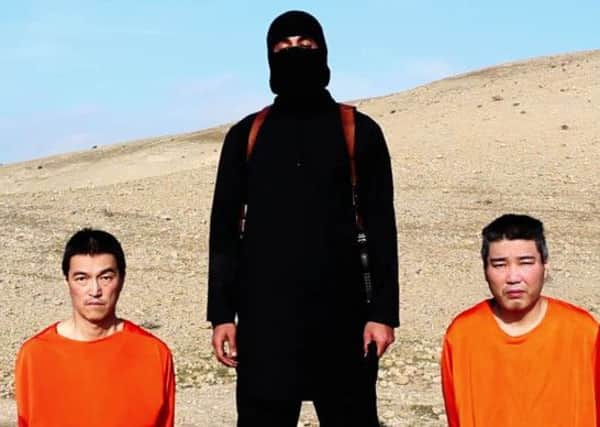Comment: Reaction to IS plays into their hands


First has been the killing of western hostages by the Islamic State of Iraq and Syria (ISIS), also called the Islamic State (IS) and the Islamic State of Iraq and the Levant (ISIL).
Advertisement
Hide AdAdvertisement
Hide AdAnd second, the debate surrounding security has culminated in the proposed new counter-terrorism bill in which police and security services will be awarded new powers to help address a terror threat that the Home Secretary, Theresa May, described as “perhaps greater than it has ever been”.
Aside from allocating new powers and concomitant loss of freedoms and legal rights based upon an uncertain adverb, too little consideration is being given to the ways in which government policies and reactions are what IS is hoping to achieve through actions such as beheadings.
It is therefore important to reflect on the purpose behind IS’ use of such violence and the responses that ensue.
Politicians and media commentators have led the denunciations of the beheadings, exemplified by David Cameron’s referring to the deaths of David Haines as “despicable and appalling… It is an act of pure evil” and “The brutal murder of Alan Henning shows just how barbaric and repulsive these terrorists are”.
Such comments are completely understandable, often encapsulating widespread feelings of anger and repulsion.
In the haste to denounce the nature of the acts, however, very little thought is placed upon why such methods are adopted.
The beheadings are carefully selected for a number of reasons which include: highlighting capabilities; raising profile; pinpointing inadequacies of western governments; heightening emotions both within western populations and IS supporters and provoking retaliation which will shift the dynamics of who are the attackers and the attacked.
The Government’s response indicates that IS’ approach is being at least partially successful. This is because the beheading strategy is carefully orchestrated for maximum impact and to provoke, based at least in part on knowledge of western sensibilities over particular causes of death.
Advertisement
Hide AdAdvertisement
Hide AdThere is nothing particularly new about the IS multi-functional strategy. Since the 1880s, radical groups have chosen methods of attack which will resonate with their intended targets and supporters.
Such groups aim to scare and intimidate and this is made considerably easier by political and media coverage of attacks and declarations such as David Cameron’s description of IS as the UK’s “greatest-ever security risk”.
The government is not so deluded as to imagine that what ostensibly constitutes calling IS unpleasant names will lead to a change in tactics.
Instead, their approach is designed to connect with people’s emotions, their concerns and the government desire to reinforce the views of the “civilised world”.
In so doing, IS gains considerable media coverage and their capabilities are promoted both to enemies and potential supporters.
Therefore, by reacting in a way that enables IS killings to achieve their purpose, governments unintentionally encourage the acts to be repeated.
On the other side of this approach, in the UK emphasising the risks creates greater civilian insecurities and demands for greater state action to protect the law-abiding masses. Thus governments step in and hand themselves more power to control the insecurities they have been instrumental in creating.
Although air strikes appear to be contributing to a current halt on their territorial advance, IS is playing a much longer game which extends beyond localised battles and into struggles over ideologies.
Advertisement
Hide AdAdvertisement
Hide AdIf governments are to be better able to win the battle of ideas, they need to place greater attention upon avoiding how IS want them to respond.
There have been 14 years since the first of the raft of additional security measures were introduced.
These have impacted disproportionately upon the communities whose support and guidance is most required in order to prevent radicalisation.
The latest proposals will further strengthen physical and psychological boundaries between peoples. In the process, the new laws will undermine the very “civilisation” that they are claimed to be protecting while conversely providing grounds for more people to become radicalised.
If the current terror threat does indeed become the greatest it has ever been, it will become the British Government’s self-fulfilling prophecy.
• Professor Stephen Vertigans is Head of the School of Applied Social Studies, Robert Gordon University, Aberdeen.
SEE ALSO